

|
|
Not Now Comrade
R2 - United Kingdom - Network Review written by and copyright: Paul Lewis (2nd October 2013). |
|
The Film
 Not Now, Comrade (Ray Cooney, Harold Snoad, 1976) 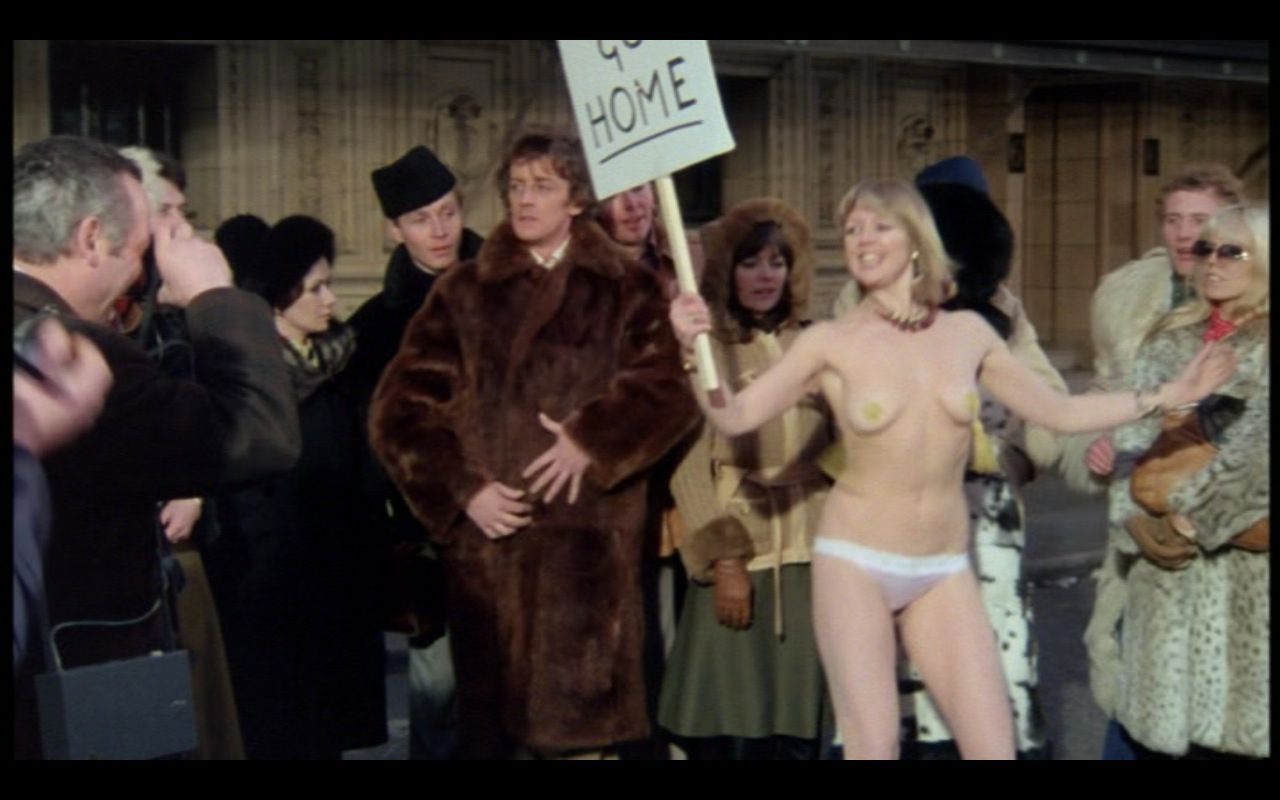 In 1973, Ray Cooney co-directed (with David Croft) the big screen adaptation of the London stage farce Not Now Darling, written by Cooney and John Roy Chapman in 1967. This film, Not Now Comrade, was devised as a sequel of sorts. Like its predecessor, Not Now Comrade has a very stage-like structure, with most of the film taking place in the home of Commander Rimmington (Leslie Phillips). The central premise of the film has its roots in Cooney’s 1964 stage farce Chase Me Comrade: both Cooney’s 1964 play and this film focus on a Russian ballet dancer who chooses to defect to the West. In 1973, Ray Cooney co-directed (with David Croft) the big screen adaptation of the London stage farce Not Now Darling, written by Cooney and John Roy Chapman in 1967. This film, Not Now Comrade, was devised as a sequel of sorts. Like its predecessor, Not Now Comrade has a very stage-like structure, with most of the film taking place in the home of Commander Rimmington (Leslie Phillips). The central premise of the film has its roots in Cooney’s 1964 stage farce Chase Me Comrade: both Cooney’s 1964 play and this film focus on a Russian ballet dancer who chooses to defect to the West.
Both Not Now Darling and Not Now Comrade fit into a period in which British cinema was becoming increasingly risqué and British comedy films were becoming more and more fascinated with the conventions of the sex farce/bedroom farce: it’s easy to forget that in 1974, the biggest hit at the UK box office was Confessions of a Window Cleaner (Val Guest, 1974). The producer of the Confessions of… films, Davina Belling, has gone on record to suggest that the success of these films was due to the fact that they were, in her words, ‘porn for all the family’: the more risqué homegrown comedies of the era offered an acceptable (most importantly, to the censors) softcore alternative to the iconography of hardcore pornography which, while still suppressed in the UK, was becoming popular in America thanks to the success of Deep Throat (Gerard Damiano, 1972) et al (Belling, quoted in Duerden, 2013: np). These films have been characterised as uniquely British: reflecting on the books which influenced the Confessions of… films, Nick Duerding argues that they were ‘sandwiched <…> between the laboured innuendo of the Carry on… films and the juvenile high jinks of Benny Hill’ and ‘branded us as sexual buffoons’: where European countries were making films like Emmanuelle (Just Jaeckin, 1974) and Last Tango in Paris (Bernardo Bertolucci, 1972) ‘in which sex is a serious, sensuous subject, often soft-focus, occasionally better with butter’, British films of the period reinforced stereotypes of the British as unable to talk about sex without making a joke about it (ibid.). Cooney’s farces, which revolve around misunderstandings and deceptions which backfire on their participants, led to French audiences and critics comparing Cooney with their own master of farce, Georges Feydeau, and referring to Cooney as ‘Le Feydeau Anglais’ (‘The English Feydeau’). Feydeau’s bedroom farces were generally of the ‘revolving door’ type, often focusing on a married man’s attempts to conceal his infidelities, eventually becoming ensnared by his own deceptions. This ‘revolving door’ structure is evident in Not Now Comrade, as characters are wheeled on- and off-stage, and identities are misrepresented and/or confused. 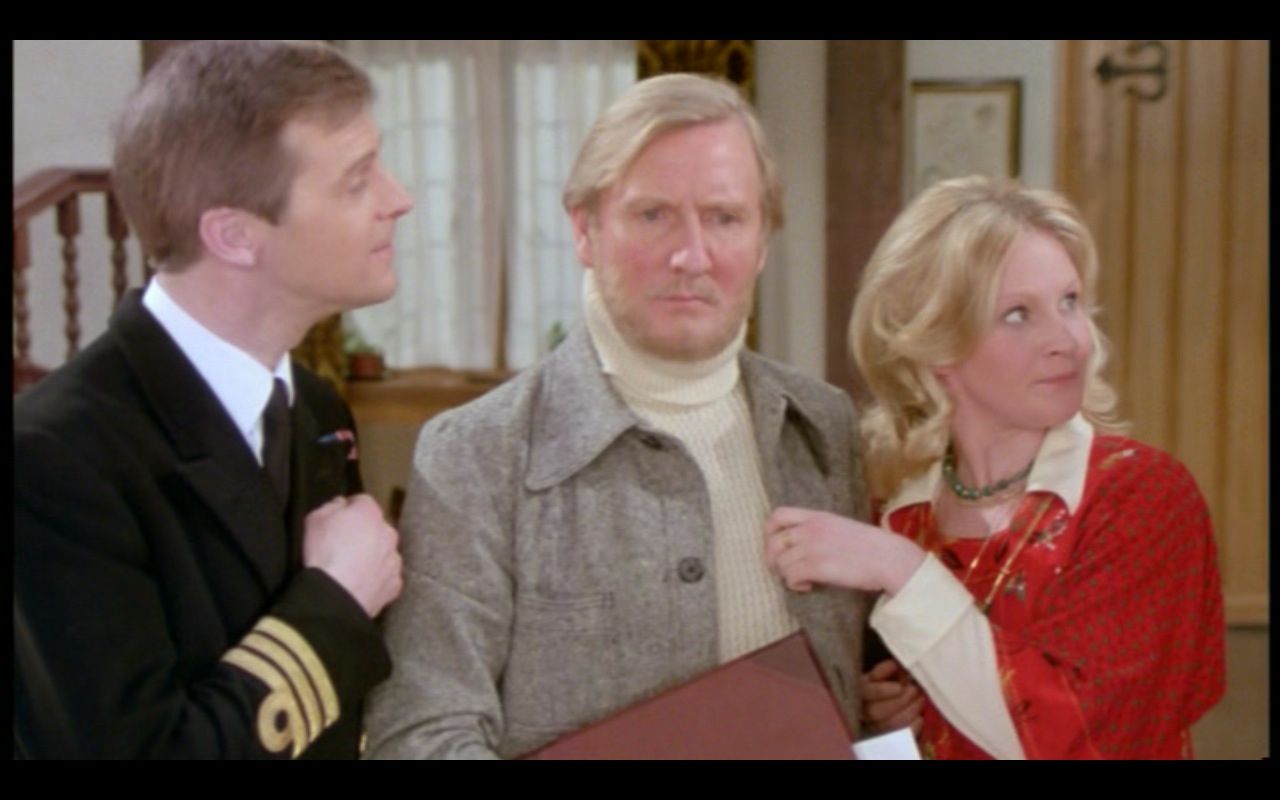 The film opens in London, where Rudi Petrovyan (Lewis Fiander) of the Russian National Ballet is being mobbed by press photographers. Meanwhile burlesque performer Barbara Wilcox (Carol Hawkins) leaves her place of employment and drives to where Petrovyan is being photographed by the press. She strips down to her burlesque outfit (a small pair of white knickers, nothing but tassels on her nipples) and interrupts the shoot whilst carrying a placard reading ‘Russians Go Home’. The site of Wilcox causes Commander Rimmington (Leslie Phillips) to stop is car. ‘Incredible’, he mutters to himself. Gerry Buss (Ian Lavender) is also distracted by Wilcox’s display, and accidentally drives his blue Mini into the back of Rimmington’s convertible, causing the boot of Rimmington’s car to open. Wilcox tells Rudi to ‘Hurry’ and get in the boot of her car, which she has left open for him: she is there to distract the press and the other members of the Russian National Ballet, thus giving Rudi the opportunity to defect. However, Rudi accidentally gets into the boot of the wrong vehicle, climbing into Rimmington’s car instead of Wilcox’s. The film opens in London, where Rudi Petrovyan (Lewis Fiander) of the Russian National Ballet is being mobbed by press photographers. Meanwhile burlesque performer Barbara Wilcox (Carol Hawkins) leaves her place of employment and drives to where Petrovyan is being photographed by the press. She strips down to her burlesque outfit (a small pair of white knickers, nothing but tassels on her nipples) and interrupts the shoot whilst carrying a placard reading ‘Russians Go Home’. The site of Wilcox causes Commander Rimmington (Leslie Phillips) to stop is car. ‘Incredible’, he mutters to himself. Gerry Buss (Ian Lavender) is also distracted by Wilcox’s display, and accidentally drives his blue Mini into the back of Rimmington’s convertible, causing the boot of Rimmington’s car to open. Wilcox tells Rudi to ‘Hurry’ and get in the boot of her car, which she has left open for him: she is there to distract the press and the other members of the Russian National Ballet, thus giving Rudi the opportunity to defect. However, Rudi accidentally gets into the boot of the wrong vehicle, climbing into Rimmington’s car instead of Wilcox’s.
Rimmington returns home, where he is greeted by his gardener Hoskins (Roy Kinnear) and his daughter Nancy (Michele Dotrice). Nancy tells her father that her new boyfriend, who is none other than Gerry Buss, is due to come to the Rimmington house that afternoon. ‘He’s the PA to the PPS to the PM’, Nancy tells her father. ‘Oh, never mind, darling. He’ll get over it’, Commander Rimmington responds. Wilcox arrives and speaks to Nancy and Hoskins, telling them that Rudi is trapped in the boot of Commander Rimmington’s car. Nancy decides to help Rudi and extract him from her father’s vehicle without the knowledge of the commander. Meanwhile, Gerry arrives at the Rimmington home. Outside the Rimmington house, Gerry encounters a couple of Soviet spies. ‘Does Commander Rimmington live here?’, Gerry asks them, oblivious that they are not locals. When the men don’t reply, Gerry repeats the question in an exaggerated rural accent. Silence follows, and Gerry leaves the men; ‘Happy muck-spreading’, he comments dryly as he walks away. Meeting with Nancy, Gerry is convinced to help Rudi. However, as they are trying to extract Rudy from the Rimmington house, a man from the government, Mr Laver (Ray Cooney), arrives and asks to speak to Commander Rimmington. Gerry presents himself to Laver as Rimmington, and Wilcox masquerades as Rimmington’s wife. Hoskins introduces Nancy to Laver as Rimmington’s daughter, but when Laver realises that Nancy and Gerry are of a similar age, Nancy corrects him and presents herself as the nanny to the Rimmington’s child. 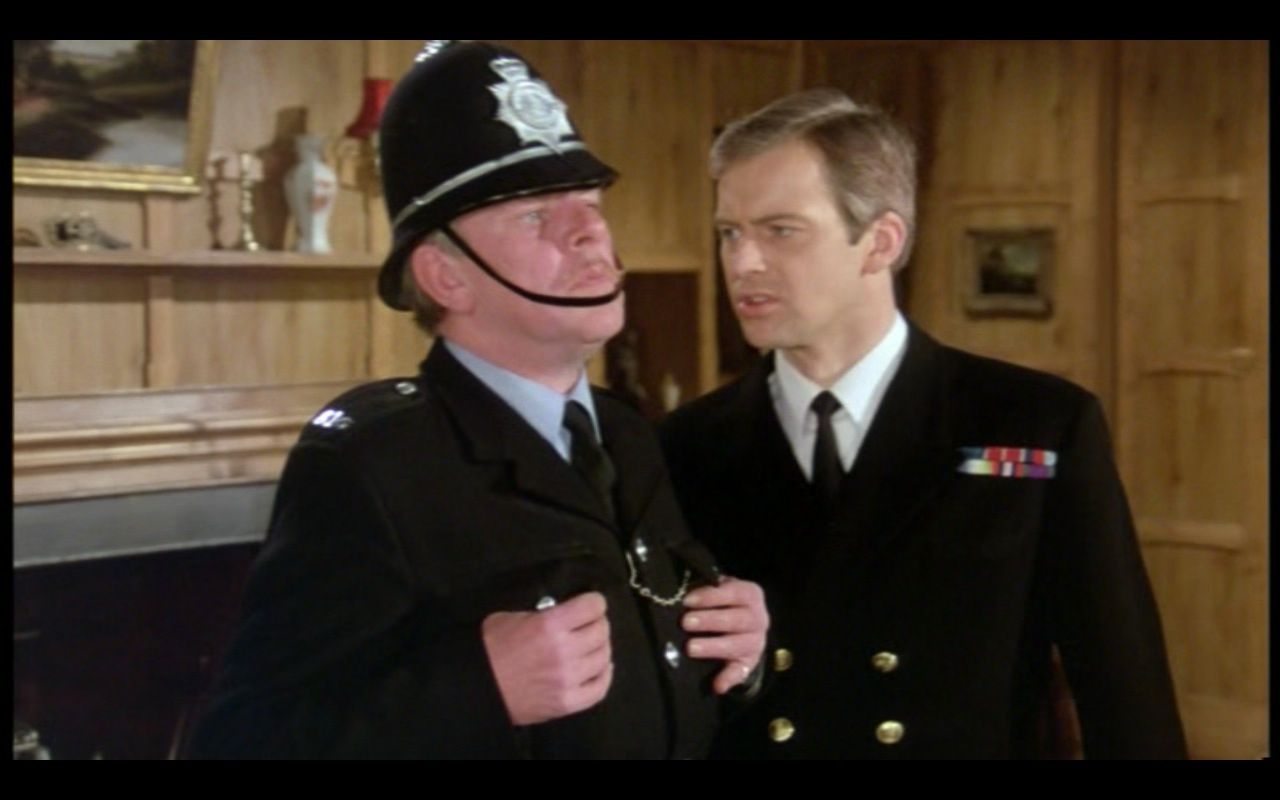 Things become more complicated when the real Commander Rimmington returns, and Nancy deceives her father, leading him to believe that Rudi is in fact Gerry. The ‘revolving door’ structure perpetuates, as characters enter and exit the stage in an increasingly rapid fashion, resulting in the various characters becoming trapped within their own lies. (At one point, Laver, who has unwittingly been plied with a fairly large amount of alcohol, enters the living room to find Gerry, who he believes to be Rimmington, in a romantic embrace with Nancy, who he believes to be the Rimmington’s nanny, leading to Gerry trying to convince Laver that the Rimmington’s have an ‘open’ relationship.) Nancy, Barbara and Gerry’s masquerade threatens to implode when the real Mrs Rimmington (June Whitfield) arrives, closely followed by two policemen (Windsor Davies and Don Estelle). Things become more complicated when the real Commander Rimmington returns, and Nancy deceives her father, leading him to believe that Rudi is in fact Gerry. The ‘revolving door’ structure perpetuates, as characters enter and exit the stage in an increasingly rapid fashion, resulting in the various characters becoming trapped within their own lies. (At one point, Laver, who has unwittingly been plied with a fairly large amount of alcohol, enters the living room to find Gerry, who he believes to be Rimmington, in a romantic embrace with Nancy, who he believes to be the Rimmington’s nanny, leading to Gerry trying to convince Laver that the Rimmington’s have an ‘open’ relationship.) Nancy, Barbara and Gerry’s masquerade threatens to implode when the real Mrs Rimmington (June Whitfield) arrives, closely followed by two policemen (Windsor Davies and Don Estelle).
The film is uncut and runs for 86:01 mins (PAL).
Video
Most of the film takes place in the Rimmington house, and in this sense Not Now Comrade is quite static and ‘stagey’. Jack Hildyard’s photography is efficient but ‘flat’, allowing the film to be carried by the script and performances. 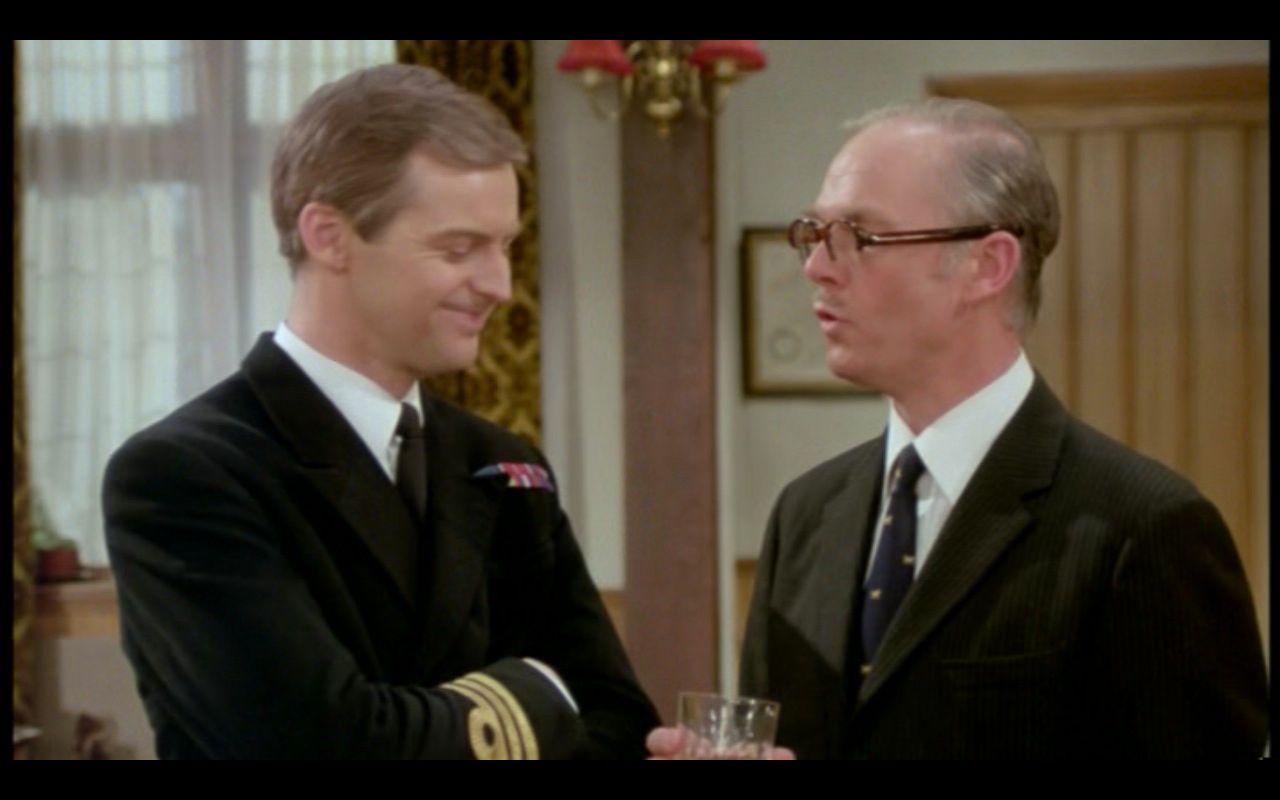 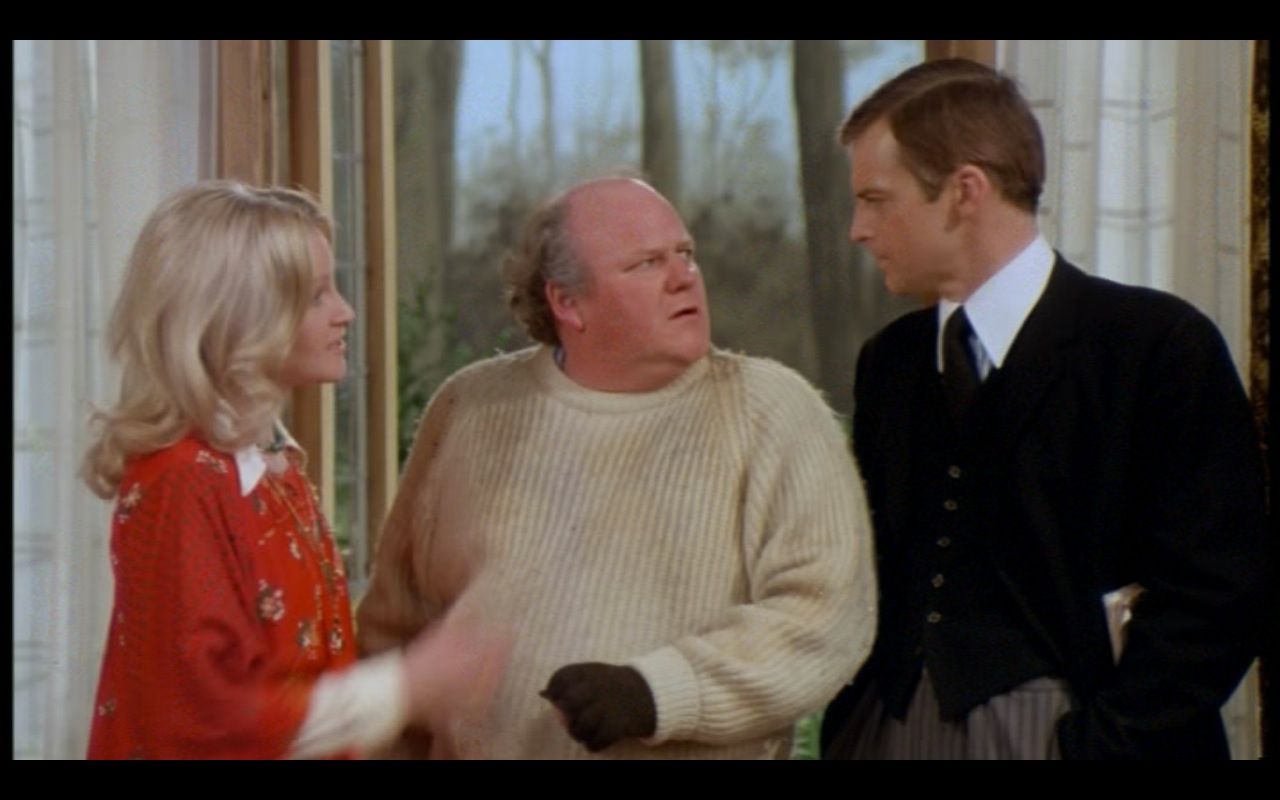
The film is presented in an aspect ratio of 1.75:1, with anamorphic enhancement. Image quality is consistently good throughout, free from wear and tear. Colours seem slightly muted, but this may be an aspect of the production rather than this transfer.
Audio
Audio is presented via a two-channel stereo track. This is free from issues. Sadly, there are no subtitles.
Extras
Extras include: - the film’s trailer (2:40); and - a stills gallery (0:34) collecting promotional materials, artwork and stills. The disc also includes the film’s original pressbook, as a ‘PDF’ file.
Overall
Not Now Comrade is a lightweight, somewhat pacy comedy that occasionally descends into obvious crude humour: ‘It’s my specialty that got him’, Wilcox tells Gerry in one scene, exposing her breasts - her modesty protected by nothing more than nipple tassels - ‘I can make one boob go one way and the other boob go the other. Would you like to see?’ Some of the dialogue is much more witty. When Rimmington overhears Nancy talking with Wilcox, he becomes confused; he enters the room and asks Nancy who she was talking to. Nancy tells her father she was having a conversation with Hoskins. ‘He’s wearing a very expensive perfume’, Commander Rimmington notices: ‘He sailed with me for twenty years, and I’ve never noticed it before’. A veritable host of faces from British comedy of the 1970s ensures that Not Now Comrade will appeal to fans of British film and television comedy of that era. It’s an entertaining, if not hugely memorable, film. References: Barber, Sian, 2010: ‘The Pinnacle of Popular Taste?: The Importance of Confessions of a Window Cleaner’. Scope (Issue 18). Duerden, Nick, 2013: ‘Confessions of a sex-farce writer: Timothy Lea's sexual misadventures to be published as e-books’. The Independent (7 April, 2013). This review has been kindly sponsored by: 
|
|||||

|